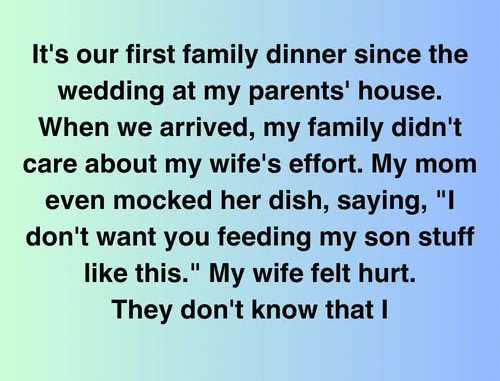
It was our first family dinner after the wedding, held at my parents’ house. My wife had spent hours preparing a special dish—jackfruit curry with coconut rice, rich with spices and tradition. It smelled incredible, but when we arrived, no one appreciated it.
My mom wrinkled her nose at the pot and muttered, “I don’t want my son eating stuff like this.” My brothers chuckled, my dad stayed silent, and I saw my wife Aaliyah’s hand tighten slightly on the tablecloth. That curry was her grandmother’s recipe from Zanzibar, a piece of her heritage. To see it mocked like that hurt her deeply.
I squeezed her hand under the table, whispering how good it smelled. She gave me a small smile, but I knew she was swallowing disappointment.
Growing up, meals in my family weren’t about love or connection. My mom ran the table like a battlefield—her food, her rules, her sharp words if you didn’t comply. She never forgot an insult, real or imagined. When I married Aaliyah, I hoped things might soften. That night proved otherwise.
Later, while we cleaned dishes in the kitchen, I overheard my mom in the living room joking loudly: “He married someone fancy—next thing, she’ll be serving us bugs.” Aaliyah froze, a plate clattering into the sink. She didn’t say a word until we were driving home, when she finally whispered: “I can’t go back there.”
She was right. I had stayed quiet to avoid conflict, but all I’d done was let her face the fire alone.
The next day, I texted my mom: We won’t be coming to family dinners until you can respect Aaliyah. Her reply was quick: If she can’t take a joke, maybe she’s not cut out for this family. I didn’t respond.
For two months, we kept our distance. It was strange—like losing a limb. But it was peaceful too.
Then Aaliyah got pregnant. We were overjoyed—and terrified. I wanted our child raised in love, not in hostility. When my dad heard the news, he called me, urging reconciliation. But all he said was, “You know how your mom is.” That excuse had been used my whole life, and I was done with it.
Still, he suggested they come visit us instead. To my surprise, my mom agreed.
The first time they came over, she handed Aaliyah a store-bought bundt cake and managed a stiff, “Congratulations. You look beautiful.” It wasn’t much, but it was more effort than before. Dinner was awkward but calm.
During dessert, my mom joked she hoped the baby would be a boy because “girls are too much drama.” Before I could react, Aaliyah smiled gracefully and said, “Well, if it’s a girl, I hope she’s strong enough to handle it.”
That moment changed everything. She wasn’t going to shrink herself for anyone. And little by little, my parents began to adjust.
When our daughter, Amira, was born, my mom actually cried in the hospital. She even asked Aaliyah for the curry recipe one day—Aaliyah gave it to her, adding a note: Best served with humility. They laughed about it together.
At Amira’s first birthday, Aaliyah’s parents flew in from Dar es Salaam, filling the house with warmth and celebration. My mom seemed overwhelmed, but when Aaliyah’s father asked about her own family, she shared something I’d never known—that her mother had mocked her too, for marrying my dad. For years she had lived under criticism herself.
That revelation stunned me. I realized my mom’s harshness wasn’t strength—it was unhealed pain passed down.
Later that night, sitting together on the porch, she admitted quietly, “I know I haven’t made this easy. But I want to do better—for her.” She didn’t say “sorry,” but it was the closest she’d ever come.
What started as a fight over curry turned into something much bigger. It became about ending cycles of disrespect, learning to stand up even when it’s uncomfortable, and giving people the chance to change—without excusing their harm.
People don’t transform overnight. But sometimes, they do change—if you give them both boundaries and grace.
And when they try, you have to let them surprise you.